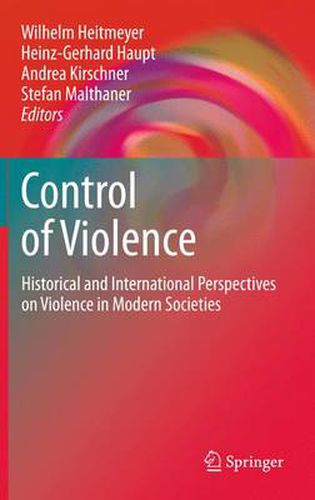Readings Newsletter
Become a Readings Member to make your shopping experience even easier.
Sign in or sign up for free!
You’re not far away from qualifying for FREE standard shipping within Australia
You’ve qualified for FREE standard shipping within Australia
The cart is loading…






This title is printed to order. This book may have been self-published. If so, we cannot guarantee the quality of the content. In the main most books will have gone through the editing process however some may not. We therefore suggest that you be aware of this before ordering this book. If in doubt check either the author or publisher’s details as we are unable to accept any returns unless they are faulty. Please contact us if you have any questions.
The Control of Violence in Modern Society, starts from the hypothesis that in modern society we will face an increasing loss of control over certain phenomena of violence. This leads to unpredictable escalations and violence can no longer be contained adequately by the relevant control regimes, such as police, state surveillance institutions, national repression apparatuses and international law. However, before investigating this hypothesis from an internationally and historically comparative perspective, the terms and tools for this undertaking have to be rendered more precisely. Since both control and violence are all but clear-cut terms but rather highly debatable and contested concepts that may take multiple connotations. The main question is whether an increase in certain forms of violence can be explained by the failure or, in turn, overeffectiveness of certain control mechanisms. It is asked, for instance, which contribution religion can make to limit violence and, in turn, which destructive potential religion might have in its fundamentalist form. Moreover, the concept of individual self-control as well as social institutions and strategies of collective disengagement and de-radicalization are investigated with regard to their potential for controlling violence. The Control of Violence in Modern Society concludes with a re-examination of the hypothesis of a loss of control by specifying in what cases and under which circumstances we can speak of a loss of control over violence.
$9.00 standard shipping within Australia
FREE standard shipping within Australia for orders over $100.00
Express & International shipping calculated at checkout
This title is printed to order. This book may have been self-published. If so, we cannot guarantee the quality of the content. In the main most books will have gone through the editing process however some may not. We therefore suggest that you be aware of this before ordering this book. If in doubt check either the author or publisher’s details as we are unable to accept any returns unless they are faulty. Please contact us if you have any questions.
The Control of Violence in Modern Society, starts from the hypothesis that in modern society we will face an increasing loss of control over certain phenomena of violence. This leads to unpredictable escalations and violence can no longer be contained adequately by the relevant control regimes, such as police, state surveillance institutions, national repression apparatuses and international law. However, before investigating this hypothesis from an internationally and historically comparative perspective, the terms and tools for this undertaking have to be rendered more precisely. Since both control and violence are all but clear-cut terms but rather highly debatable and contested concepts that may take multiple connotations. The main question is whether an increase in certain forms of violence can be explained by the failure or, in turn, overeffectiveness of certain control mechanisms. It is asked, for instance, which contribution religion can make to limit violence and, in turn, which destructive potential religion might have in its fundamentalist form. Moreover, the concept of individual self-control as well as social institutions and strategies of collective disengagement and de-radicalization are investigated with regard to their potential for controlling violence. The Control of Violence in Modern Society concludes with a re-examination of the hypothesis of a loss of control by specifying in what cases and under which circumstances we can speak of a loss of control over violence.